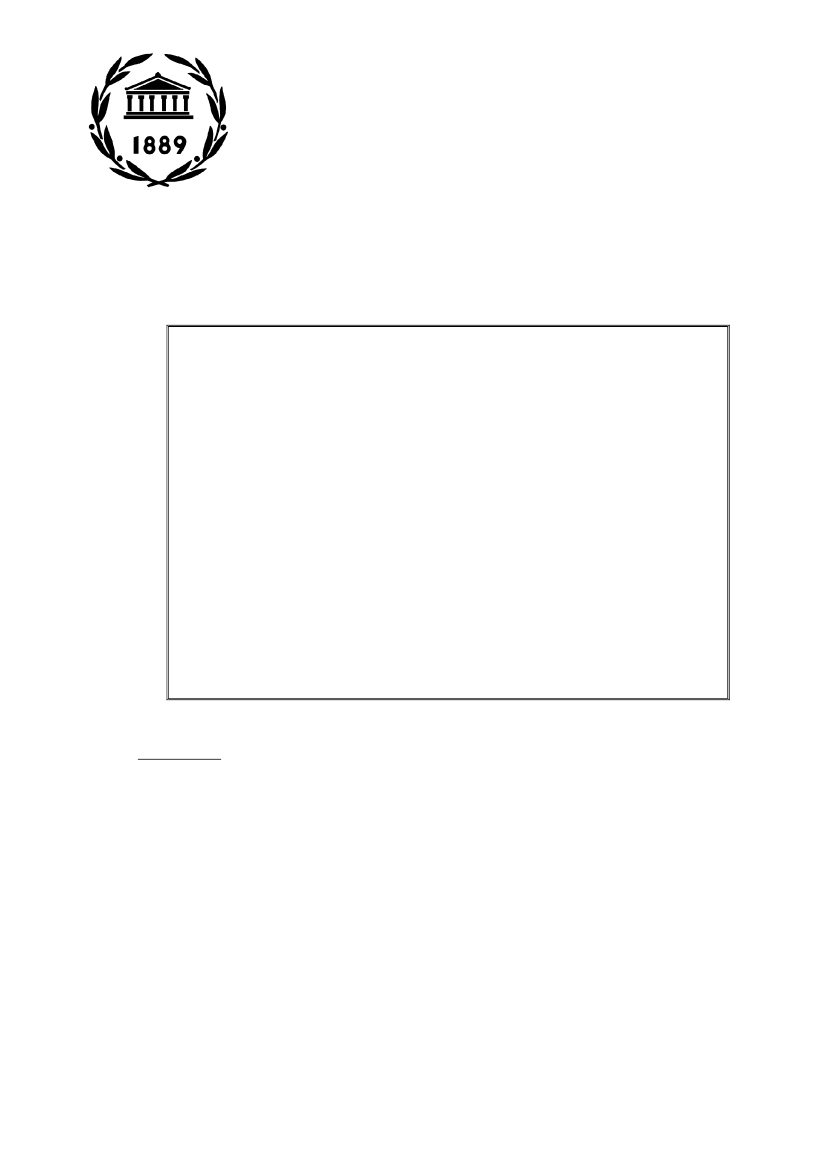Dansk Interparlamentarisk Gruppes bestyrelse 2009-10
IPU Alm.del Bilag 16
Offentligt
INTER-PARLIAMENTARY UNION5, CHEMIN DU POMMIERCASE POSTALE 3301218 LE GRAND SACONNEX / GENÈVE (SUISSE)
TELEPHONE(41.22) 919 41 50 -FAX(41.22) 919 41 60 -E-MAIL[email protected]TELEGRAPHIC ADDRESS:INTERPARLEMENT GENEVE
28 May 2010LEGAL FOUNDATION FOR THE IPU
Explanatory note prepared by the IPU Secretariat
At the recent IPU session in Bangkok, a round of preliminary discussionstook place on the proposal to “re-establish” the IPU on the basis of aninternational convention. IPU Members were subsequently invited tocontinue their reflection on the matter both internally and through theirrespective geopolitical groups, addressing their questions to the IPUSecretariat if need be.To facilitate this process, the Secretary General was requested to provide oralexplanations to the geopolitical groups and prepare a succinct note withanswers to some of the frequently asked questions about the proposedconvention and its implications.This note was first presented to the Preparatory Committee of the 3 WorldConference on Speakers of Parliament in early May 2010 and is nowsubmitted to the entire IPU membership as food for thought, with a view toan in-depth discussion on the matter during the forthcoming IPU session tobe held in October 2010.rd
Introduction1.Today there is widespread international recognition of the importance of havingdemocratic parliaments in all countries that can fully assume their constitutional role atthe national level and provide a parliamentary dimension to international cooperation.2.It is also necessary for the international community to pay far greater attention toparliaments and provide them with more sustained support. This includes a need forgreater understanding of and support for IPU's unique role as the world organizationof parliaments.3.An international convention would offer an unequalled opportunity for theinternational community - represented by governments and by parliaments - to worktogether through the IPU in pursuit of these twin objectives. For these reasons, thePresident of the IPU has started to engage the IPU membership and many Speakers of
-2-parliament in a reflection on the possibility of "re-creating" the IPU through aninternational convention.
-3-Objective4.The proposal aims at securing a clear expression of States’ commitment to worktogether in the IPU - through their parliaments - to promote democracy at the nationaland international levels.5.The proposal involves concluding an international convention on the IPU wherebyStates would vest their representation in the IPU in their national parliament, andtherefore not alter its parliamentary nature. The Convention would enhance the IPU’spolitical and diplomatic status and strengthen its ability to promote democracy. Itwould place the IPU on an equal footing with other major international organizationsand would facilitate cooperation with them. It would also allow the IPU to operate withthe necessary guarantees in all countries.Background6.The Inter-Parliamentary Union traces its origins back to a time when very fewinternational organizations were based on a treaty concluded between States. Thefounders of the organization drafted Statutes and Rules which they agreed to applyand uphold. The first Statutes were adopted in 1894; the latest amendments werepassed in 2009.7.Over time, the Organization's membership grew from a few members ofparliament to groups of parliamentarians in each country and, eventually, to thenational parliaments themselves. Today, over 150 countries are represented in the IPUthrough their parliaments.8.The IPU does not conform to traditional legal doctrine whereby the terminternational organization has come to be defined by reference to a particular methodof establishment.Under this formal approach, international organizations arenecessarily based upon multilateral treaties and the law of treaties forms part of the lawof international organizations.9.While the Statutes define the IPU as the international organization of theparliaments of sovereign States and some States recognize the IPU as an internationalorganization, others do not. The IPU clearly has a legal personality that allows it to acton the international plane. It concludes agreements with parliaments to organizeconferences. It receives grants and implements projects under formal agreements towhich it is a party.10. However, the IPU is not based on an international convention and as long as thissituation persists, the IPU will remain in an ambivalent situation: a recognized actor onthe international scene without the status of an international organization.11. This ambiguity colours the IPU's dealings with many States and internationalorganizations and it adversely affects the Organization's ability to carry out its mandateto the satisfaction of its members. It is reflected in the United Nations General
-4-Assembly resolution granting the IPU observer status in which UN Member Statesclassify the IPU as an organization that has an "inter-State" character.
-5-Issues12. So far, discussions have taken place within the IPU Executive Committee and therdCommittee set up to prepare the 3 World Conference of Speakers of Parliament. Theissues raised by members during these discussions can be divided into six broad areas.Some of the more salient points made when addressing these issues are summarizedbelow.(a)Is this really necessary?The view of the proponents of the proposal is that it is both necessary and urgentfor parliaments to bolster IPU's public profile and to provide it with substantialpolitical and material support, and that this can be achieved by concluding aninternational convention for the Organization in which States commit themselvesto promote democracy through parliaments working in the IPU.The IPU is a global forum for parliamentary debate and exchanges. It facilitatesinter-parliamentary cooperation.Its interlocutors are parliaments andparliamentarians. They are the Members, they formulate the political views of theorganization, they help organize its activities and they participate in them.Governments have not traditionally been significant counterparts of the IPU.The IPU has a unique mandate and rich expertise in relation to democracy andthe rule of law. It is a parliamentary organization and it knows and understandsparliaments. It is a centre of excellence for parliamentary practice that helpsdevelop standards for parliaments, assist them in assessing their performance anddevelop programmes to make them more representative, accessible, transparent,accountable and effective. It defends the human rights of parliamentarians. Ithelps women enter parliament and politics. It builds capacity in parliament tomore effectively legislate and hold government to account in a broad range ofareas.In all of these activities, the IPU is increasingly working in countries in closecontact with States represented by their governments. Many of these activitiescan only be carried out successfully through the cooperation of governments andoften with their financial support. The IPU is currently facing a demand for itsservices that it cannot meet for lack of support and resources.The IPU also faces problems of double taxation, absence of immunities for itsofficials and problems of obtaining visas for delegates attending conferences.These problems can be solved if the IPU is recognized as an internationalorganization established through a Convention.(b)Are there any other ways of achieving the main objectives?It is possible to ask each parliament to pass legislation that would have the effectof assimilating the IPU with international organizations under each country'snational law. Proceeding in this manner would however not bring the politicaland material support to the IPU that is being sought. Moreover, it would be noless cumbersome than concluding an international convention and ensuring its
-6-ratification in Parliament, and it would provide no guarantees of uniformtreatment of the IPU.Other alternative avenues for action do not readily present themselves. It wouldnot appear feasible to address the issue through a resolution of the UnitedNations General Assembly because the IPU is not (and should not be) part of theUN System, and because a UNGA resolution on this subject would requireunanimous support by all Member States which may be elusive.(c)Is it possible without fundamentally altering the IPU or its relations with itsmembers?Consultations undertaken so far with constitutional and international legal expertsindicate that it is possible for States to establish an international organizationthrough an international convention and to vest the representation of the State inthat organization in an entity other than the Government. It is therefore possiblefrom a juridical point of view to "re-create" the IPU through an internationalconvention without altering its parliamentary nature. Parliaments would continueto represent each country in the IPU and would lead and take the Organization'sdecisions.Concluding an international convention would represent an opportunity tomodernize the IPU. Beyond merely employing more contemporary languagewhen describing IPU's objectives, it could involve streamlining some of itsstructures and working methods. However, those decisions would in the firstinstance have to be taken by the IPU's membership. Any project for a Conventionwould first need to be endorsed by the IPU membership.The proposal does not entail a change in IPU's relationship with its members. TheConvention does not require devolution of power from national parliaments tothe IPU. The IPU complements and assists parliaments, but it is not a substitutefor them. Any comparison between the IPU and the emergence of parliamentaryassemblies attached to regional inter-governmental bodies would thereforeapriorinot be appropriate.The discussions so far have not revealed a desire or need for changing the natureof the parliamentary representation in the IPU. Those (very few) parliaments thatprefer to be represented in the IPU through a National Group could continue todo so under the proposed convention.(d)Will it lead to a divided IPU?An international convention would have to be preceded by extensiveconsultations among IPU Members and their governments and it clearly shouldonly be pursued if a very large number of them are in agreement. It is expectedthat the convention will be adhered to from the very beginning by a large numberof countries. It is also suggested that entry into force of the Convention shouldrequire a relatively high and geographically representative number of ratifications.
-7-Parliaments have on past occasions demonstrated an ability to influencegovernmental decisions that relate to the IPU. Several substantive resolutionsadopted by States in the UN General Assembly that relate to cooperationbetween the UN and the IPU have counted very significant numbers of formalsponsors.That said, during an initial period it may be expected that some Parliaments willbe members of the IPU by virtue of their current membership whereas others willbe members as a result of their country having signed and ratified theConvention. This is unavoidable. Two types of Members will therefore need tobe foreseen in the Convention itself during a period of transition. It will also benecessary to make some provisions in the Convention so that States that areparty to the Convention are protected from other countries taking "unilateral"decisions regarding the IPU.
-8-(e)Is it linked to the IPU becoming a "parliamentary counterpart" to the UnitedNations?The short answer to this question is yes. Establishing a stronger relationshipbetween the United Nations and the IPU requires the IPU to be clearly recognizedas an international organization based on a Convention concluded betweenStates.The IPU is at the origin of the notion that international cooperation and theUnited Nations requires a "parliamentary dimension". It is a leading proponent ofa greater parliamentary presence in international cooperation.It helpsparliaments identify the steps that they and States need to take to bring greaterdemocracy to international relations and it assists them in their implementation.Greater progress requires close cooperation with and support from governmentssince international cooperation is organized by States acting through theirgovernments. To this end, the IPU needs to be more clearly acknowledged as aninternational organization with all the prerogatives to engage fully with Statesand other international organizations.The IPU sees itself as the global parliamentary counterpart to the United Nations.It is committed to helping parliaments understand the work of the United Nationsand facilitate their task of providing a parliamentary dimension to the work of theUnited Nations. It requires a strategic partnership between the UN and the IPUwhich, in turn, presupposes that the IPU itself is clearly recognized as a fully-fledged international organization.The IPU's vision for its own role has been set out by the first two global SpeakersConferences and is reflected in the position paper adopted by the IPU'sGoverning Council in 2007 (see atwww.ipu.org/Un-e/ipu-117-un-e.pdf).Itidentifies a supporting (not supplanting) role for the IPU. In order to carry outthis role, however, the IPU needs to be (and be perceived as) an equal. For thisreason as well, it is essential for the IPU to be an international organization basedon a convention.(f)What are the expected cost implications?Concluding an international convention for the IPU does not have a costimplicationper sesince the organization already exists. However, part of therationale for the project is to obtain greater support by countries for the IPU andits mission. That will also entail providing it with additional financial resources.Currently the IPU operates with a budget of some CHF 12,000,000 funded by itsmembers. In addition, it seeks funding for an initial additional amount of someCHF 6,000,000 from voluntary sources. Currently the IPU is developing a missionstatement and strategy for its future development that will be accompanied by amore detailed description of expected financial requirements.While these amounts may be somewhat higher than the estimates developed sofar, they nonetheless remain very modest in comparison to the significantly larger
-9-amounts that several countries spend on financing inter-parliamentarycooperation and capacity building programs for parliaments either directly on abilateral basis (government to government) or indirectly through inter-governmental organizations.
- 10 -Process13. The proposal has so far been discussed by the Executive Committee during itsthth256 and 257 sessions in February and March of this year. At its request, the SecretaryGeneral briefed the six geopolitical groups on the initiative and responded to theirndinitial questions during the 122 IPU Assembly in Bangkok last month.14. At the concluding sitting of the IPU Governing Council on 1 April, the IPUPresident urged all Members to study the matter in the coming months and to shareany questions with the Secretariat, which will be at their disposal for furtherclarification. The Secretariat will share both the questions it receives and theclarification it provides on a continuous basis with the membership to facilitateprogress at the next session in October.15. Each geopolitical group is encouraged to follow the example set by the AfricanGroup, which is setting up a working group, with representation from the differentregions of Africa and the participation of its Executive Committee members, to studythe proposal in depth. The working group will consult with experts and governmentsand will present its opinion to the African Group when it meets in October. The IPUSecretariat is at the disposal of the African Group, and indeed of all the othergeopolitical groups, to assist them in their deliberations. The Executive Committee willalso set up its own working group to reflect further on that subject and consult with asmall group of Member Parliaments.16. The IPU President encouraged Speakers of Parliament to discuss the matter whenrdthey convened for the 3 World Conference of Speakers of Parliament in Geneva in July2010. The President concluded that the Executive Committee would proceed in athorough and measured manner, allowing sufficient time for all Members to considerevery aspect of the proposal.Conclusion17.Concluding an international convention on the IPU will demonstrate States’commitment to work together - through their parliaments - to promote democracy atthe national and international level. It will directly benefit parliaments and theirmembers. It will give political and diplomatic support to the IPU and will strengthen itsability to promote democracy and help strengthen parliaments everywhere. It willplace the IPU on a more equal footing with other major international organizations andwill facilitate its cooperation with these organizations. It will make it possible for theIPU to operate with the necessary guarantees in all countries.










